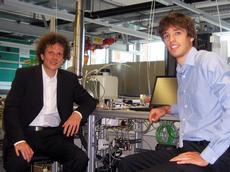Environmentally friendly capturing of CO2 from the air
They could rise to one of the human race's biggest challenges: the two PhD students from ETH Zurich Christoph Gebald and Jan Wurzbacher filter CO2 out of the air, and in a way that is completely environmentally friendly and emission-free at that. The promising ETH-Zurich spin-off "Climeworks" has also won over the "Venture Kick" judges: the fledgling company is to receive 130'000 francs in prize money.

They haven’t reinvented the wheel; after all, we've known how to capture carbon dioxide (CO2) for some time now. However, the problem has always been that the technology needs such vast quantities of energy – until now. Under the watchful eye of Aldo Steinfeld, professor of renewable energy carriers at ETH Zurich, the doctoral students Christoph Gebald and Jan Wurzbacher have now devised a novel apparatus that can separate CO2 from air in a more energy-efficient manner, before re-releasing it as pure raw material. This pure CO2 can then be processed to synthetic liquid fuels such as gasoline, diesel, or jet fuel. Both the capture of CO2 and its conversion to liquid fuels are performed using solar energy.
In close collaboration with the Solar Technology Laboratory at the Paul Scherrer Institute, Steinfeld’s group is also developing reactor technology for CO2 and water splitting using concentrated solar energy – a thermochemical cycle based on a so-called metal-oxide redox system. The resulting syngas (a mixture of mainly hydrogen and carbon monoxide) can then be converted into liquid fuels.
With their development, the ETH-Zurich researchers are “killing two birds with one stone” (see picture below): the climate problem and the threat of an oil shortage. That sounds very much like saving the planet, but unfortunately these dimensions still remain in the distant future.
Special filter
The prototype of their CO2 separator is still very much on the drawing board and leaves a lot to be desired in terms of energy efficiency. However, the two budding researchers are optimistic about the future. At least three other teams around the world are working on a similar project, but the ETH-Zurich method has one distinct advantage: the heart of the development lies inside, in the filter material, which can adsorb (suck up) the CO2. For the ETH-Zurich students, the discovery of the material constitutes a sizeable leap in the global research on CO2 capture from the air.
The key aspect is that the patented material consists of renewable raw materials and what’s more can be fabricated cost-effectively. Then there’s the fact that the technology developed by Gebald and Wurzbacher runs at a low-temperature heat of below 100°C, meaning all the energy needed can be supplied by conventional flat-plate solar collectors, without producing any additional emissions. And because the device can suck the CO2 directly out of the ambient air, it can – with respect to the necessary solar radiation – be applied independent of the location.
First greenhouse test
The first fully functional prototype is due to go into operation in a greenhouse facility in the Canton of Zurich in 2012. Natural gas is often burned in greenhouses to produce the CO2 necessary for plant growth. “Our system enables us to supply pure CO2 at a more affordable price that doesn’t cause any more damage to the environment during production; quite the opposite, in fact, as the CO2 is removed from the atmosphere”, says Jan Wurzbacher.
The two PhD students believe that the further development can be accelerated if the technology has to hold its ground on the market, so they founded Climeworks GmbH last November – an official spin-off of ETH Zurich. The first commercial product should have reached market maturity in about two years and Climeworks is looking to capture CO2 from the air on a large scale by 2016 – according to the business plan anyway.
130,000 francs in prize money
This ambitious business plan was key in the ETH-Zurich spin-off’s success in the finals of the support initiative Venture Kick: “Climeworks” is to receive a total of 130,000 francs, which is especially important for market entry and further development. The two founders are now looking to bring a third team member into the fold as soon as possible, mainly to take care of the management side of things, “So that we can plough all of our energy into research and development of our technology further”, says Gebald.
The two native Germans are good friends as well as a good team. They met during their first week at ETH Zurich and it’s no coincidence that they ended up running a spin-off together: “No sooner had we got to know each other than we decided to found a company”, explains Gebald. And if all of their plans turn out this well, maybe we’re one step closer towards saving the planet after all.








READER COMMENTS